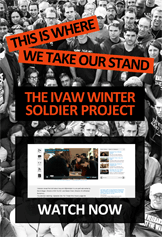Iraq Veterans Against the War encourages Active Duty, National Guard, and Reserve troops that have questions about the war to contact the IVAW GI Outreach Committee at gioutreach@ivaw.org . Confidentiality is assured.
Know Your Rights
The chain of command may tell you that you "signed away your rights when you signed on the dotted line". However, even under regulations, that is not the case. Among many other political rights, you have the ability to both join and participate in IVAW. Click here to find out more.
Want to know more about joining? Click here.
GI Rights Hotline
A network of nonprofit, nongovernmental organizations who provide free and confidential information to service members about military discharges, grievance and complaint procedures, and other civil rights to include a toll free phone hotline (1-877-447-4487). Every member of the military should know about this resource. If you would like convenient pocket cards, either for yourself or for other members of your unit, contact gioutreach@ivaw.org .
Appeal for Redress
The Appeal for Redress provides a way in which individual service members can appeal to their Congressional Representative and US Senators to urge an end to the U.S. military occupation of Iraq. The first Appeal signatures were delivered to members of Congress on January 16, to coincide with at the time of the Martin Luther King, Jr. Day in January 2007. Appeal for Redress will continue to collect signatures until all active duty, Guard, and active reserve soldiers are out of Iraq. Click here for more information and to sign the appeal.
Conscientious Objector information
There are two types of Conscientious Objectors in the United States military. They are all servicemembers who have religious, moral, or ethical grounds for not participating as a combatant in war. Some conscientious objectors have accepted non-combatant roles and remained in the military. Others find that their beliefs do not allow them to continue to be a member of a military which supports war-as even noncombatant roles are crucial to the military war effort.
The military regulations concerning conscientious objection can be found here.
Resistance in the Military
Courage in the military does not always mean boldly facing the physical dangers of battle. The courage to stand up in the face of adversity to do the right thing and set the ethical example is a value every military member should have. Brave and courageous men and women have refused and challenged illegal and unlawful orders during numerous wars, even refusing unlawful orders to be part of illegal wars.
One famous example during the Vietnam war was Warrant Officer Hugh Thompson, who stopped the infamous massacre at My Lai. Chief My Lai prosecutor William Eckhardt described how Thompson responded when confronted with evidence of atrocity: "He put his guns on Americans, said he would shoot them if they shot another Vietnamese, had his people wade in the ditch in gore to their knees, to their hips, took out children, took them to the hospital..flew back to headquarters, standing in front of people, tears rolling down his cheeks, pounding on the table saying 'Notice, notice, notice'...then had the courage to testify time after time." Like many other resistors challenging unjust, unethical, and illegal actions, Hugh Thompson was ignored at the time, largely hidden and generally dismissed by military history. However, his actions, much like those of many other resisters, were crucial to saving the lives of innocents.
Health Issues Fact Sheets
The possibility of death or injury as a result of military service is often associated with combat hostilities. However, one of the leading causes of injuries amongst veterans is not a result of the hostile actions of enemy combatants. Neglect and corruption in the system has harmed many currently serving servicemembers who may not even be aware of their danger-from contaminated water to hazardous waste in burn pits, faulty electricity, and more. In addition, many military personnel are suffering from the "hidden illness"-Post Traumatic Stress Disorder, which can severely damage the quality of a member's life without treatment.
The longer these conditions go unidentified and untreated, the worse they will become. Cancer, birth defects, leukemia, family violence, sterility, and others may result. It is important to be tested if you believe you may have one of these conditions, or have been exposed to carcinogen-causing contamination.
What will happen if I go AWOL?
Being AWOL can be a serious offense with serious consequences, especially during a period of war. However, many military personnel during the Vietnam war and the current war in Iraq have gone absent without leave as a last resort, refusing to be forced into violating their conscience and legal duty to refuse and challenge unlawful orders. For more information on the regulations governing AWOL/UA, click here.
Support for Families
Military Families Speak Out (MFSO)
MFSO is an organization of people opposed to the war in Iraq who have relatives or loved ones in the military. Formed by two families in November of 2002, they have contacts with military families throughout the United States, and in other countries around the world. Their membership currently includes over 3,000 military families, with new families joining daily.
Gold Star Families For Peace (GSFP)
Families of soldiers who have died as a result of war are organizing to be a positive force in our world to bring their country’s sons and daughters home from Iraq, to minimize the “human cost” of this war, and to prevent other families from the pain they are feeling as the result of their losses.


